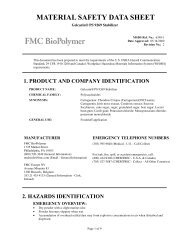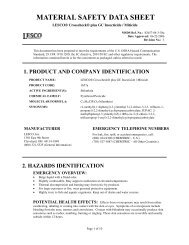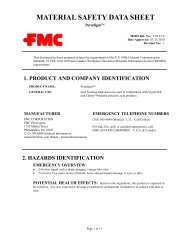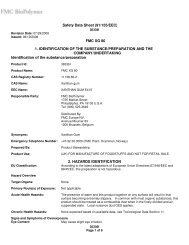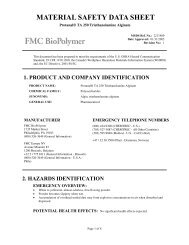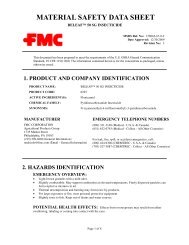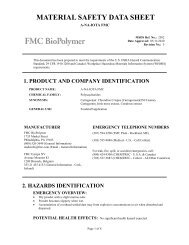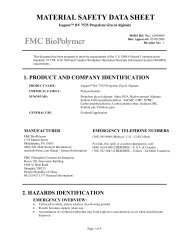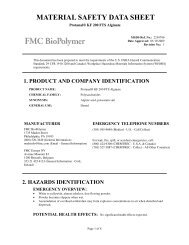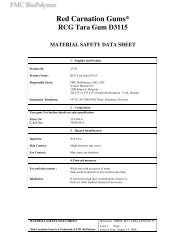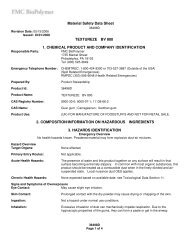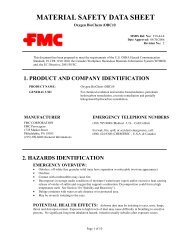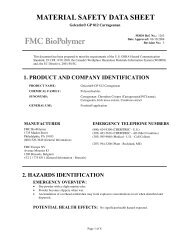Chairman's - FMC Corporation
Chairman's - FMC Corporation
Chairman's - FMC Corporation
You also want an ePaper? Increase the reach of your titles
YUMPU automatically turns print PDFs into web optimized ePapers that Google loves.
<strong>FMC</strong> CORPORATION<br />
NOTES TO CONSOLIDATED FINANCIAL STATEMENTS—(Continued)<br />
program of risk management that includes the use of foreign currency debt and forward foreign exchange<br />
contracts. We also use forward foreign exchange contracts to hedge firm and highly anticipated foreign currency<br />
cash flows, with an objective of balancing currency risk to provide adequate protection from significant<br />
fluctuations in the currency markets.<br />
The primary currency movements for which we have exchange-rate exposure are the U.S. dollar versus the<br />
euro, the U.S. dollar versus the Chinese yuan and the U.S. dollar versus the Brazilian real.<br />
Hedge ineffectiveness related to our outstanding foreign currency exchange cash flow hedges recorded to<br />
earnings during the years ended December 31, 2009 was a loss of $(0.1) million. There was no such activity in<br />
2008 and 2007.<br />
We hold certain forward contracts that have not been designated as hedging instruments. Contracts used to<br />
hedge the exposure to foreign currency fluctuations associated with certain monetary assets and liabilities are not<br />
designated as hedging instruments, and changes in the fair value of these items are recorded in earnings. The net<br />
pre-tax gains (losses) recorded in earnings for contracts not designated as hedging instruments in 2009, 2008 and<br />
2007 were $(36.9) million, $18.5 million and $(8.6) million, respectively.<br />
Commodity Price Risk<br />
We are exposed to risks in energy costs due to fluctuations in energy prices, particularly natural gas. We<br />
attempt to mitigate our exposure to increasing energy costs by hedging the cost of future deliveries of natural gas<br />
and entering into fixed-price contracts for the purchase of coal and fuel oil.<br />
Hedge ineffectiveness, related to our outstanding commodity cash flow hedges recorded to earnings for the<br />
years ended December 31, 2009, 2008 and 2007 were losses of $(0.6) million, $(0.2) million and $(0.1) million,<br />
respectively. The net pre-tax (loss) recorded in earnings for commodity contracts not designated as hedging<br />
instruments in 2009 and 2008 was $(0.2) million and $(0.5) million, respectively. There was no such activity in<br />
2007 related to commodity contracts not designated as hedging instruments.<br />
Interest Rate Risk<br />
We use various strategies to manage our interest rate exposure, including entering into interest rate swap<br />
agreements to achieve a targeted mix of fixed and variable-rate debt. In the agreements, we exchange, at<br />
specified intervals, the difference between fixed and variable-interest amounts calculated on an agreed-upon<br />
notional principal amount. During 2009, we entered into derivatives to hedge the interest rate risk of the Senior<br />
Notes due 2019. These hedges were terminated when the Notes were issued and the loss, which was immaterial,<br />
was included in capitalized issuance costs. As of December 31, 2009 and December 31, 2008, we have no such<br />
swap agreements in place.<br />
Concentration of Credit Risk<br />
Our counterparties to derivative contracts are limited to major financial institutions and organized<br />
exchanges. We limit the dollar amount of contracts entered into with any one financial institution and monitor<br />
counterparties’ credit ratings. We also enter into master netting agreements with each financial institution, where<br />
possible, which helps mitigate the credit risk associated with our financial instruments. While we may be<br />
exposed to credit losses due to the nonperformance of counterparties, we consider this risk remote.<br />
101



